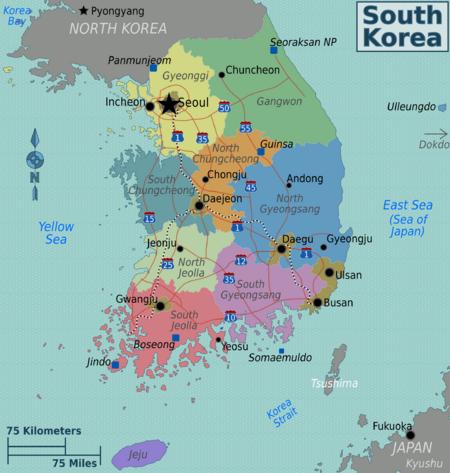Public & National Holidays in Korea

South Korea, officially the Republic of Korea is an independent state in the Southern part of the Korean Peninsula with mostly mountainous terrain. South Korea covers a total area of 99,392 square kilometers and has a population of 50 million. Its capital is Seoul which is also its largest city with a population of 9.8 millions.
South Korea officially follows the Gregorian calendar to celebrate public holidays, although some holidays are based on the lunar calendar as well. Public holidays include national holidays, bank holidays and school holidays observed in Korea all through the year. National holidays include both historical as well as religious celebrations. Public holidays are regulated by Regulation on Closure Days for Public offices, the State Holidays Act and the Labour Day Act. Banks, schools and offices remain closed during public holidays; however, shops and restaurants remain open.
Lunar New Year’s Day (observed on 1st day of 1st lunar month) and the Korean Thanksgiving Day (September 30) are the most celebrated traditional holidays in South Korea. On both occasions the holiday is observed for a total of three days.
Instructions
-
1
Holidays in January
1st - New Year's Day
Koreans celebrate 1st of January as the New Year Day to mark the start of a new Gregorian calendar year. -
2
Holidays in February
9-11 - Korean New Year
The 1st day of the Lunar Korean Calendar (February 10 of solar calendar) is celebrated as the Korean New Year and it is one of the most celebrated traditional holidays in Korea. It is considered more important as compared to the Gregorian New Year’s Day (celebrated worldwide on January 1). The country observes holidays for a total of three days (February 9 to 11). -
3
Holidays in March
1st - Independence Day
The Koreans celebrate Independence Day on 1st of March every year to commemorate the March 1 Movement carried out by 33 Korean National students in 1919. -
4
Holidays in May
5th - Children’s Day
Koreans observe Children’s Day on May 5 every year to commemorate the children under the age of 18 years.
17th - Buddha's Birthday
Koreans celebrate the Birthday of Gautama Buddha on the 8th day of the 4th lunar Month (May 17 of solar calendar) every year. It is one of the most important traditional holidays observed in South Korea. -
5
Holidays in June
6th - Memorial Day
This day is observed to commemorate the people who died during the independence movement. A national commemoration ceremony is also held by the government of Korea in the Seoul National Cemetery. -
6
Holidays in July
17th - Constitution Day
The Koreans observe Constitution Day on July 17 every year to celebrate the propagation of the Constitution of the Republic of Korea. The day is not observed as a day off though. -
7
Holidays in August
15th - Liberation Day
August 15 is celebrated in South Korea as the Liberation Day. This is the day when the government of Republic of Korea was established back in 1948. -
8
Holidays in September
19th - Midautumn Festival
Midautumn Festival or Thanksgiving Day is by far the most important and the most celebrated day in South Korea. It is celebrated in the 15th day of the 8th lunar month, and the country observes holidays for three days. -
9
Holidays in October
1st - Armed Forces Day
The Koreans observe Armed Forces Day on October 1 to recognize and honour the armed forces of the Republic of Korea. Schools, banks and public offices remain open on this day though.
3rd - National Foundation Day
The country celebrated National Foundation Day on 3rd of every October.
9th - Hangul Day
The Koreans celebrate October 9 as Hangul Day to commemorate the invention and declaration of the native Korean language alphabet ‘hangul’. -
10
Holidays in December
25th - Christmas Day
Christianity is the second major religion in South Korea after Buddhism, and the citizens, irrespective of their religious views, get a day off on December 25 to celebrate Christmas.







